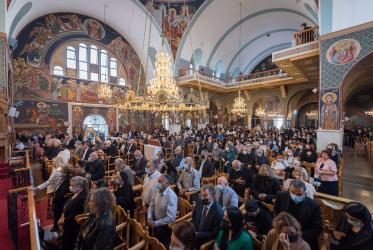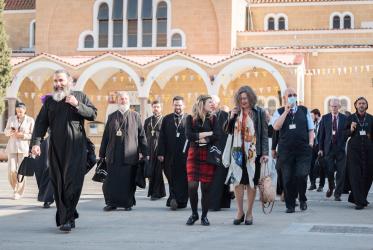WCC Seventh Assembly (1991)
Evangelical participants at the Canberra Assembly felt it necessary and appropriate to offer a message in response to their experience of the Assembly. Together with several serious concerns which are particular to Evangelicals, many issues raised here overlap with those expressed in the message from the Orthodox participants from the same assembly, as well as other concerns often labeled as "Orthodox". These include calls for a greater theological rigor, and in specific an insistence on the particularity of the Holy Spirit and a "higher" Christology. An interesting text of relevance (the Association for Church Renewal's jubilee appeal to the Harare Assembly) can be found at www.episcopalian.org/acr/jubilee.htm.
A letter to churches and Christians worldwide from participants who share evangelical perspectives
We wish to share with you the challenges we have received, the lessons we have learned and our observations on the assembly.
Background
The sixth assembly of the WCC at Vancouver in 1983 made increased dialogue, with participation by evangelicals in WCC activity, a priority. The WCC expressed this commitment by seeking greater involvement from evangelicals within the member churches of the WCC, promoting interchange with evangelical consultations such as Lausanne II at Manila, and increased input in WCC consultations and working groups from those in charismatic, evangelical and pentecostal movements both within and beyond the WCC.
Our experience
Evangelical participants at Canberra accepted the invitation of the WCC to participate in its deliberations on the theme: "Come, Holy Spirit - Renew the Whole Creation". We felt welcomed in the dialogue and were able to contribute in concrete ways and at all levels. We were listened to, for example, as the assembly worked on a biblically informed theology of creation, relevant to the eco-crisis we face. As the assembly discussed the process of listening to the Spirit at work in every culture, we cautioned, with others, that discernment is required to identify the Spirit as the Spirit of Jesus Christ and thus to develop criteria for and limits to theological diversity. We argued for a high Christology to serve as the only authentic Christian base for dialogue with persons of other living faiths. Some drafts of assembly documents appear to show reluctance to use straightforward biblical language, but the opportunities for evangelical perspectives to find inclusion in the reports of the assembly represented real progress in the dialogue begun in Vancouver.
Despite such a sincere commitment to take more seriously that major segment of the worldwide church which those with evangelical perspectives represent, evangelicals remain under-represented at Canberra, at the level of plenary presentation and in leadership of sections. For this reason, we have asked the leadership of the WCC to address structural deficiencies in the Council by welcoming an evangelical presence on every commission, just as women's and Orthodox perspectives have been solicited, and to establish a monitoring group composed both of WCC staff and evangelical advisers from member and non-member churches.
We who hold evangelical perspectives, however, must share the responsibility for the present theological imbalance within the WCC.
There is presently insufficient commitment to ecumenical activity by evangelicals in member churches of the WCC and in churches in the wider Christian communion. This has helped perpetuate the divisive stereotype that the WCC can only assist churches with regard to issues of justice and human rights while organizations like the Lausanne movement and the World Evangelical Fellowship should be turned to for insight concerning evangelism. In fact, insofar as all these organizations claim to express the whole gospel, they all need to listen to and learn from one another.
Theological concerns
The moderator of the central committee of the WCC identified in his report that the WCC has remained unable to develop a "vital and coherent theology". Our experience of the assembly confirms this. The ecumenical movement needs a theology rooted in the Christian revelation and is relevant to contemporary problems. At present, there is insufficient clarity regarding the relationship between the confession of the Lord Jesus Christ as God and Saviour according to scripture, the person and work of the Holy Spirit, and legitimate concerns which are part of the WCC agenda. We share many of these concerns, such as those related to justice, peace and the integrity of creation, to the contextualization (or inculturation) of the gospel, and to religious pluralism. This theological deficit not only conspires against the work of the WCC as a Christian witness but also increases the tensions among its member churches.
We encourage individuals and churches with evangelical concerns to engage themselves in serious theological reflection to fill the existing gap. The challenge is to develop a theology forged in the midst of obedient action for the sake of the gospel, so as to bring together the apostolic faith and the suffering of the oppressed, the personal and the social, the private and the public, justification by faith and the struggle for peace with justice, commitment to Christ and action empowered by the Holy Spirit in the midst of the crises facing the modern world.
Practical challenges
1. We have been challenged again by the call for Christian unity which the WCC has had as its vocation. We call those with evangelical concerns to place high priority on visible expressions of Christian unity.
2. Evangelicals need to take a more active part in ecumenical events, both evangelicals who are part of member churches and those who are outside; for example we draw attention to the WCC youth event in 1992 in which we hope that the evangelical youth movements will also be able to participate. Evangelical youth movements have a long experience of empowering young people.
3. In light of the assembly theme, "Come, Holy Spirit - Renew the Whole Creation", we were concerned at the failure of the assembly to highlight the significant contribution of pentecostal and charismatic Christians to the renewal of the church in its life and worship. Fearing that we too are all too often guilty of treating them in the same way, we urge non-pentecostal evangelicals to work towards greater respect, harmony and cooperation with pentecostal and charismatic Christians.
4. The assembly challenged us to respond more adequately to the needs of indigenous and marginalized peoples in our own contexts. It alerted us to the special predicament of Aboriginal people in Australia. Aboriginal evangelicals who participated in our meeting shared their pain and anguish and the lack of support for their churches received from evangelicals in general. They call on evangelicals to support their aspirations for recognition as a people with a culture shaped by the interaction between their traditional culture and the biblical perspective, for their right to self-determination, and to support their struggle for justice and land rights.
5. The experience provided by the assembly of work in sub-sections enabled evangelicals and those from other perspectives to discover each other not as antagonists but as believers together. In particular we recognized the many common theological commitments and concerns with the Orthodox. We strongly urge that conversations and encounters between evangelicals and the Orthodox be fostered as soon as possible to explore common ground and address differences.
6. We have been challenged to pursue the examination of our own experience and expression of the syncretism between Christianity and cultural traditions. We cannot address the charge of syncretism to the religious experiences of people in the two-thirds world without at the same time examining afresh the degree to which Christianity in the Western world has easily assimilated aspects of its own culture such as rationalism and individualism.
7. Very inadequate attention was given in the assembly to the dramatic and far-reaching changes that have taken place in Eastern Europe. It raised questions about the way in which sections of the ecumenical movement supported the ruling ideologies in Eastern Europe. We were challenged to examine ways in which Christians are tempted to align themselves uncritically with the spirit of the age. We were also encouraged by the witness of those Christians in Eastern Europe whose testimony witnesses to the power of the Holy Spirit to sustain God's people and to bring new life amidst death and adversity.
8. The debates on the Gulf war forced us to recognize the inadequacy of the traditional just-war theory which evangelicals have by and large embraced, except for those from the peace tradition. We are challenged to work afresh on a Christian approach to war and peace-making in a modem context.
9. The inadequacy of theological reflection in the handling of complex issues regarding justice, peace and the integrity of creation challenges us to recognize the lack of such reflection on those themes among evangelicals and the need for intensive theological reflection in these areas.
10. We have been challenged by the leadership of women in this assembly. Women were visible and active participants in the full programme of the assembly including worship (both preaching and administering the eucharist); section work, plenary sessions, business and committee actions as well as the educational offerings of the visitors' programme. The assembly was enriched by the participation of these many gifted women. This challenges the evangelical movement to reassess its theological understanding of women's spiritual giftedness and to take care that it does not unwittingly quench the activity of the Holy Spirit.
We thank God for the opportunity we have had to be involved in this assembly. We humbly encourage evangelical Christians everywhere to join us in praying "Come, Holy Spirit - Renew the Whole Creation" and begin with us.




